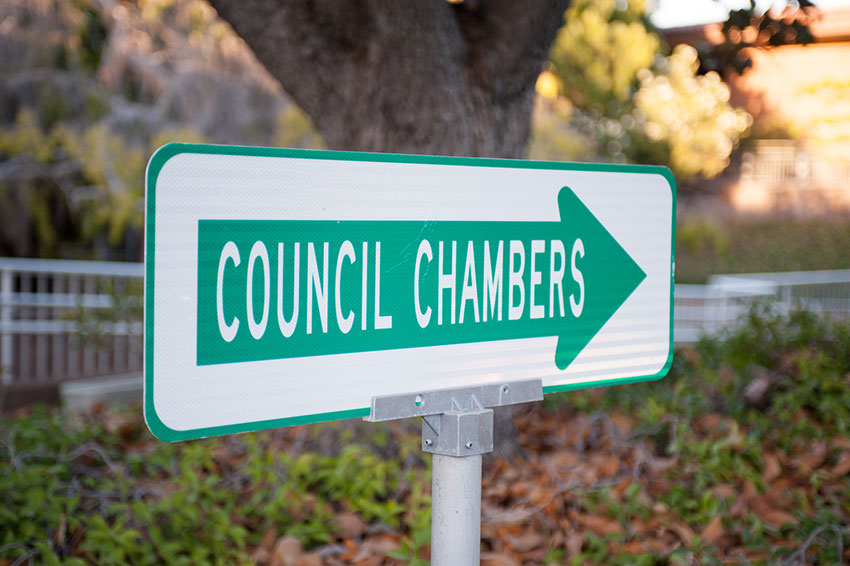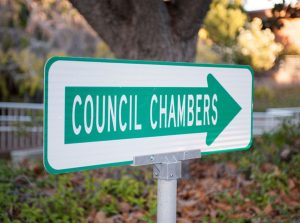After enacting rules aimed to quash prostitution, the Santa Clara City Council is dialing back these regulations to help restore massage parlors in the City.
In the months leading to Super Bowl 50, which was held at Levi’s Stadium, the Council began having concerns that brothels in the City would masquerade as massage parlors. Consequently, it enacted regulations that prevented massage parlors from opening within 500 feet of, among other things, other massage parlors, schools, daycares, hotels and single-family homes.
As housing developments began getting built, many parlors no longer complied. Santa Clara saw its number of massage parlors drop from 51 in 2015 to 15 today, according to City documents.
Reena Brillot, Planning Manager, said the City rules relegated massage parlors to mostly industrial areas of town. The new approach, she said, is to “bring [them] back into active commercial districts.”
Although the City will allow its 15 parlors to continue to operate, the new rules will make it more difficult for parlors to operate as brothels and impose more stringent penalties for those who do not comply. For instance, the City will require the front lobby of the parlors to be unobscured by curtains or blinds and prohibit an establishment whose permit is revoked from operating as a massage parlor for 5 years.
The new rules will allow hotels with at least 100 rooms, “wellness centers,” strip malls and employment centers with at least 500 employees to operate massage parlors.
Vice Mayor Patricia Mahan suggested the Council direct the City Manager’s office allow gyms with onsite massage services be worked into the second reading of the ordinance, a suggestion that the Council heeded.
‘Affordable Housing’ Hot Topic
Housing for the poor was a topic that came up frequently at Tuesday night’s meeting.
Jonathan Veach, Housing Manager, presented a report to the Council detailing the performance of programs made possible through Housing and Urban Development grants.
More than half — $1.6 million out of roughly $3 million — of grant money went toward the City’s Tenant Based Rental Assistance Program, which aims to alleviate homelessness. That program served 76 adults and 106 children in 2018-19.
Mayor Lisa Gillmor also implored the Council to defer giving the go-ahead to a housing development on Calle Del Mundo because of its attachment to the Tasman East Specific Plan and below market rate element.
The developer, ZAEN, has requested a lower percent of mandated below market rate apartments in its more-than-900 apartment development located at 2310 Calle Del Mundo.
Although ZAEN is asking for 5 percent instead of City’s usual 10 percent below market rate units, the developer said it will make those units much less expensive if allowed to have fewer than is usual. If allowed to offer 30 apartments instead of 80, ZAEN said those apartments would be at 50 percent area median income instead of the required 80 percent area median income. Area median income for a single person, according to HUD, is slightly more than $90,000/year.
Gillmor said she worried about setting a precedent, especially without knowing how lowering the number of below-market-rate apartments fits into the specific plan.
“If we do this for this project, are we prepared to do it when the other developers come forward and ask for other projects … ?” she said.
The Council voted unanimously to defer the item.
SVP, Bike Plan Strive To Make City Greener
Although it has a 1.2 percent drop in sales growth, Manuel Pineda, Assistant City Manager and Silicon Valley Power (SVP) Chief Electric Utility Officer, said SVP is trending upward.
During a presentation of SVP’s strategic plan, Pineda said expenses have been lower than expected, and SVP issued nearly $3 million in rebates over the past year. Several capital improvement projects, including the launch of four new substations are also in the works, he added.
Further, the City is looking to convert as many of its fleet of vehicles to electric vehicles as soon as possible as well as increase the number of charging ports for electric vehicles.
“The demands are just going to keep increasing,” said Council Member Teresa O’Neill. “We are all going to have to change the way we live.”
The City also unveiled its new bike plan, which will double the amount of bikeable streets from 70 miles to 142 miles.
Micheal Liw, Assistant Director of Public Works, called the plan “very ambitious,” saying the City wants to “encourage biking” and that it is “trying to change people’s behavior, change the culture.” With only 1.8 percent of trips being taken on a bike, Liw said the City is pushing to get that up to 5 percent by 2026.
With $28 million worth of work needing to be done to fully make the proposed changes a reality, Liw said the City is prioritizing 10 projects — which include stretches of El Camino Real, Prunridge and Scott Boulevards — that will cost more than $6.7 million.
A handful of members of the public spoke in favor of the plan with the only criticism being that it was not aggressive enough. No one spoke against the plan.
O’Neill said the City needs to be less reliant on grants for such projects.
“We need to put some skin in the game,” she said. “If we want people to change, we have to model that change.”
City Settle Class-Action Over Stadium Accessibility
The Council also voted unanimously to accept a settlement in a class-action lawsuit against the City and the Forty-Niners Management Company (ManCo) for Americans with Disabilities Act (ADA) violations at Levi’s Stadium.
ManCo will have to pay $24 million to the plaintiffs, along with $13.5 million in legal fees and remedy the violations within the stadium. The City is responsible for bringing the public right of ways surrounding the stadium up to compliance.
This is not the only time the City has taken heat for its lack of prioritizing ADA compliance.
The Council meets again on Tuesday, Oct. 8 in the Council Chambers at City Hall, 1500 Warburton Ave. in Santa Clara.












“the Council began having concerns that brothels in the City would masquerade as massage parlors. ”
The council is rather naive.
Most of this illegal activity is run out of apartments, not store fronts.